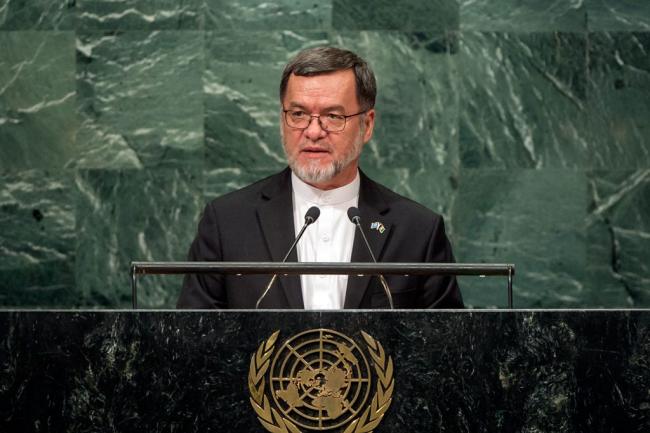
Dialogue and cooperation most viable path to peace, Afghan Vice-President tells UN Assembly
In his address to the Assembly’s annual general debate, Sarwar Danesh stated that the UN remains the single most important international body for promoting global peace, security and prosperity, and highlighted that further strengthening the Organization should be a priority for all in the way forward.
“The UN’s vital role in helping Afghanistan transition into a democratic and pluralistic society is a clear example of its profound impact in helping to create real change for the betterment of societies and communities around the world,” said Vice-President Danesh.
Highlighting the serious security challenges the country continues to face, particularly from violent extremists such as the Taliban and the Islamic State of Iraq and the Levant (ISIL/Da'esh), he urged the international community implement its pledges in the fight against terrorism and to avoid a dual policy of making a distinction between ‘good’ and ‘bad’ terrorists.
“We ask all of you: where were the previous leaders of the Taliban and A1-Qaeda residing, and where were they killed? At this very moment, where are the leaders of the Taliban and Haqqani network located? From where and how are terrorists being trained, equipped and financed during a full-scale war?” he asked the world leaders.
The Vice-President stressed that despite numerous calls on Pakistan to destroy known terrorist safe havens, “Unfortunately [we] are yet to witness any change in the situation,” he added.
Also stating that terrorism and radicalism are threats against global peace – as witnessed by signs of radicalism in different forms in Europe and America, and incidents of terrorist attacks in many countries of the world – the Afghan leader said broad holistic measured were needed to defeat the scourge and called on the UN to hold an international conference on the fight against radicalism with the aim of introducing a new legal framework to combat terrorism.
Drawing particular attention to the devastation and terror in Syria, he said Afghanistan fully supports a comprehensive solution to the conflict that reflects the will of all Syrians. On other issues of wider concern, he said the nuclear tests conducted by the Democratic People’s Republic of Korea (DPRK) are dangerous for the region and could endanger world peace and security.
Reporting on the progress Afghanistan has made despite the challenges it confronts, Mr. Danesh said that the country is aiming to strengthen greater involvement and ownership of all Afghans in implementing reforms and furthering national interests.
He further noted that over the past two years, the country made considerable progress in reducing maternal and child mortality, increasing access to education, improving basic freedoms, strengthening infrastructure, and promoting rule of law, justice and human rights.
The leader added that strengthening political transparency and electoral reform remain the major priorities of the National Unity Government, as does combating narcotics, noting the cooperation between the country and the UN Office on Drugs and Crime (UNODC) and other international partners.
He added that in two weeks, Afghanistan would join its international partners at a conference in Brussels to review and decide on the full scope of joint partnership on the way forward.
He also reported that his country continues to accord importance to its relations with all regional countries, as well as the Islamic world, noting its membership and partnership with the South Asian Association for Regional Cooperation (SAARC), the Economic Cooperation Organization (ECO), the Shanghai Cooperation Organization (SCO) and numerous other regional blocs. He further noted that Afghanistan has signed documents of long-term cooperation with a number of its allies, including the United States, European Union, and the North Atlantic Treaty Organization (NATO).
Further noting that Afghanistan considers other Islamic countries as strong partners to strengthen cultural, social, and economic ties and to promote peace and coexistence, as well as present a moderate interpretation of Islam, he added: “Islam, as a religion, has a clear thought, culture, civilization and history that on the one hand respects human dignity, rights and freedoms and drives national sovereignty from the will of people, and on the other hand, is against any kind of injustice, exclusivism, hatred, radicalism and violence.”
In conclusion, the Vice-President of Afghanistan highlighted once again, “[the country’s] firm commitment to the realization of a world in which peace, harmony, justice, and tranquillity prevails.”
UN Photo/Cia Pak
Source: www.justearthnews.com
Support Our Journalism
We cannot do without you.. your contribution supports unbiased journalism
IBNS is not driven by any ism- not wokeism, not racism, not skewed secularism, not hyper right-wing or left liberal ideals, nor by any hardline religious beliefs or hyper nationalism. We want to serve you good old objective news, as they are. We do not judge or preach. We let people decide for themselves. We only try to present factual and well-sourced news.







